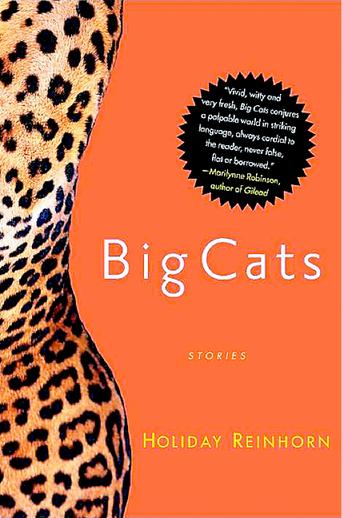But as anyone who has been through analysis knows, identifying a problem sometimes just makes it worse. At the very least it can make you aware you're unable to stop. And so one after the other, the cast and crew of Big Cats pinwheel toward crack-ups, knowing all along their triggers have been set off.
Take for instance the hero in “Get Away from Me David.” After an earthquake rattles his place of work, Reinhorn's alcoholic bank manager begins to see visions of his dead wife. Somehow hearing his “sponsor” tell him over the phone that he is not alone doesn't help.
David is not the only damaged soul here trying to get by on compromised means. “My Name” features a Vietnam vet who starts up a relationship with a catatonic woman. The narrator of “Seashell” minces through the days, knowing deep down that his developmental disability cuts him off from the world. Sad to say, these are the most well-adjusted of the lot.
Unlike David Foster Wallace, who sometimes sneers at the loners and misfits he brings to life, Reinhorn treats her characters with fairness and dignity. She does not describe their ailments with Excessive Capitalization, for example, nor does she coat them with a blanket of irony.
This allows their problems to rise to the fore. What exactly is appropriate about turning a dead child's room into a shrine, wonders the grieving mother in “Good to Hear You.” In “The Heights,” a tipsy woman swerves into another inappropriate story about her husband's philandering. Her social gaffe is made all the more cringe-worthy by the fact that her husband is sitting right next to her, incapacitated by a stroke.
It bears mentioning that although Reinhorn saddles her big cats up with the big problems, she also leavens the rodeo with big-time humor. If you don't laugh aloud at least once while reading this collection I think there's a chance you do in fact need medication. Just take a gander at this zingy, zippy first line:
“If you're wondering what I'm doing in Junie Greenough's covered pickup on the shoulder of a public highway, with a cooler full of Viennese horse sperm locked in the back, well, that would be today's very good question.”
Not all of Reinhorn's stories find the right balance between humor and cynicism, and a few do a downright belly flop in the process. “Golden Pioneers” and “Good to Hear You” both unfold in a removed first person voice that makes it difficult to tell whether you're supposed to care about the narrator or the protagonists of her stories.
This is a minor gaffe however in a very promising debut. For when Reinhorn is on—which is most of the time—she can spin a tale so strange and singular it has its own magnetic warble. Were it not for its cutesy title, the lead story would be a pitch-perfect riff on the casual brutality of our teenage years. And “Get Away From Me David” might just be the strangest thing to appear between two covers since George Saunders' “Civilwarland in Bad Decline.”
So readers beware. Read these stories with a squinty eye and an open heart, just don't expect to be unaffected. Cart them on to public transport and you might resemble one of its characters: a person sitting in public laughing at something imaginary—or in some cases crying.









